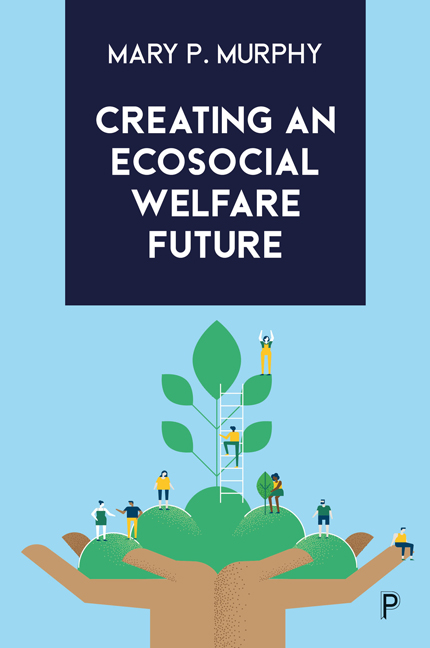Book contents
- Frontmatter
- Dedication
- Contents
- List of figures and tables
- Acknowledgements
- Introduction: The case for a welfare imagination
- PART I From problems to solutions: a post-growth ecosocial political economy
- PART II Building an ecosocial imaginary
- PART III An ecosocial political imaginary
- Conclusion: The case for systemic transformation
- Appendix: Ireland
- Notes
- References
- Index
8 - Imaginaries and ideas
Published online by Cambridge University Press: 20 January 2024
- Frontmatter
- Dedication
- Contents
- List of figures and tables
- Acknowledgements
- Introduction: The case for a welfare imagination
- PART I From problems to solutions: a post-growth ecosocial political economy
- PART II Building an ecosocial imaginary
- PART III An ecosocial political imaginary
- Conclusion: The case for systemic transformation
- Appendix: Ireland
- Notes
- References
- Index
Summary
Graeber and Wengrow (2021, p 505) reflect on the possibility that we are stuck and unable to imagine or shape new social realities. The greatest poverty we should fear is poverty of our imagination, and many observe an intellectual vacuum when it comes to imaginative alternatives (Cumbers, 2018; Jones and O’Donnell, 2018). This is a chicken and egg conundrum: it is easier to mobilise people if they believe an alternative is possible, but without mobilisation it is difficult to generate alternatives (Meadowcroft, 2007). Alternatives need not be highly developed, nor do they need to be policy blueprints or detailed maps. Our social and political imagination provides direction or compass points, while our institutional or programmatic imagination can articulate the first steps of travel.
The first section of this chapter argues for policy imagination and for the need to articulate alternatives in the tradition of ‘realist pragmatism’ or ‘real utopias’ and assesses the role of ideas in orienting change during crisis (Wright, 2013; Fitzpatrick, 2014). The second section of the chapter examines the importance of framing alternatives in constructive, offensive rather than defensive, language capable of mobilising a wide range of actors, uniting rather than dividing society and offering hope in being ‘for’ rather than ‘against’. This underscores the importance of who articulates alternatives and draws attention to the ‘vocabularies of our imagination’ (Massey, 2013). The Irish section reviews examples of framing transformative ideas in recent constitutional referendums that led to a level of transformation many middle-aged feminist activists (like me) could only dream would happen in their lifetime.
Imagination and ideas
Imagining how to live together
Many, in exploring the central organising principle of sustainable alternatives, draw on various visual images, myths and parables to demonstrate how ancient wisdoms of sustainable life collectively point towards ‘balance’ as a core principle or value (Green, 2016; Raworth, 2017; Leicester, 2020; Jackson, 2021). This orientation inspired the visual motif of this book, a symmetrical spider's web holding together and joining the dots between the book's themes.
- Type
- Chapter
- Information
- Creating an Ecosocial Welfare Future , pp. 129 - 140Publisher: Bristol University PressPrint publication year: 2023



